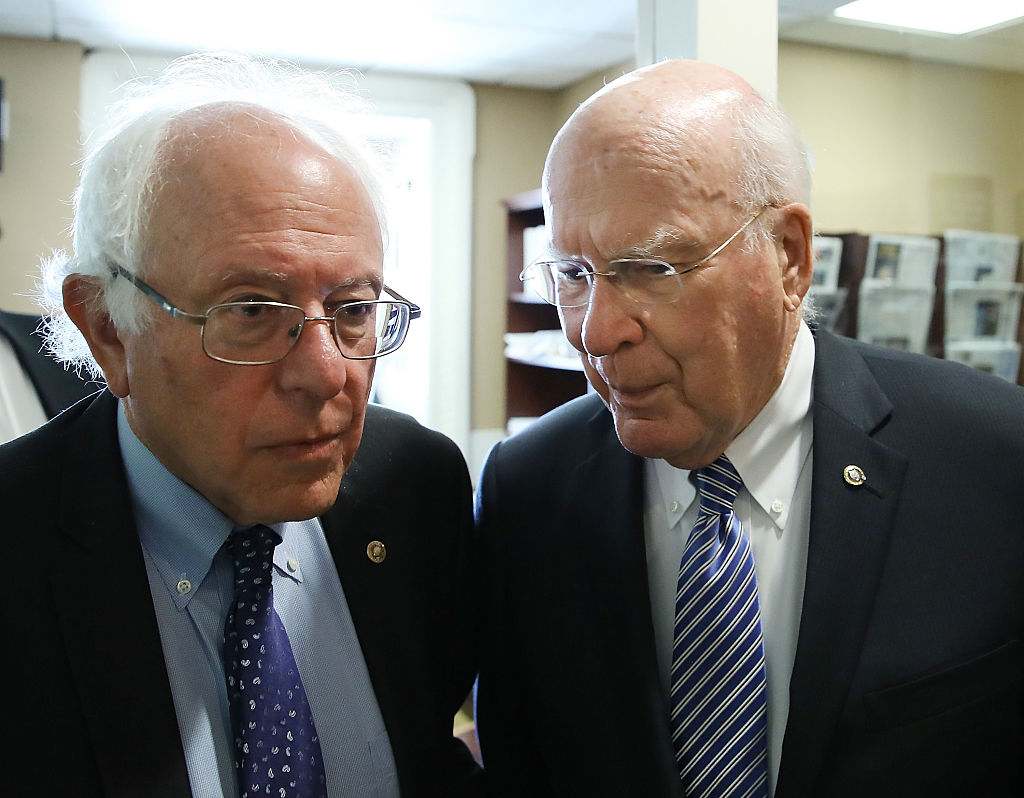Like characters in a dystopian novel, the elderly bore the worst of it.
Dianne Feinstein, whose friends were already whispering about how there she really was, was found walking back and forth between her private room and common area, which she was required to come to over and over again just to get through the 16-hour ordeal. Chuck Grassley, only a year younger, confessed to taking 10-minute naps and struggling to stay awake, while lamenting how he missed his family. Patrick Leahy, 84 and coming off hip surgery, was lucky. He received more comments about the Batman sticker on his wheelchair than he did questions about why he was even there in the first place. “Pat, I’m glad you’re here,” the comparatively juvenile Tim Kaine (64) remarked. “We shouldn’t have to suffer alone.” That camaraderie in misery was not shared by their friend, Bernie Sanders, 80, who frustrated everyone by dragging out the sad affair with an amendment that would have extended the child tax credit. An impatient Sherrod Brown, 69, was overheard muttering, “C’mon, Bernie.”
Scenes from dystopian fiction? A breakdown in the social hierarchy at The Villages?
Nope. This is the self-styled “World’s Greatest Deliberative Body,” the United States Senate.
It was 16 hours of “vote-a-rama” over the weekend, the pejorative used for the reconciliation process required to get the Inflation Reduction Act of 2022 passed. The original Build Back Better plan was a gigantic, ambitious, and ultimately doomed effort by the Biden administration to cover everything from childcare to climate change in one fell swoop. Depending on which version and analysis you believe, it was supposed to cost anywhere from $1 trillion to $5 trillion. And it was heralded as downright FDR-like, the next New Deal.
At least the delay whittled it down from unprecedented multi-trillion-dollar leviathan to more run-of-the-mill multi-billion-dollar rebrand. The IRA comes in spending at least $260 billion while claiming to raise $326 billion through taxes and other budgeting changes over a 10-year period, totaling around $700 billion. Of course, with the last minute amendments added during the “vote-a-rama,” it might be a while until anyone really knows how much it costs.
This is governance in the United States of America in the Year of Our Lord 2021. It’s a long way from “sweeping generational change” to force-marching octogenarians through a process that would get a nursing home shut down and written up on charges.
Voting against deadlines and in the face of real-time emergencies is the only way massive legislation gets passed anymore. This coincides with the now-regular occurrence of omnibus bills of thousands of pages and diverse interests packaged together to prevent any scrutiny or objection. Let’s be honest: does anyone outside the staffers and the lobbyists who write the text actually know what’s in these monstrosities?
This is the natural result of a longstanding tradition of sliding things that are unpalatable — like non-military spending and waste — into defense appropriations or the raining of money that was Covid-19 relief. Because both national security and pandemic aid are regarded as untouchable, it makes it look bad for anyone who puts up a fight. This is in addition to the good, old-fashioned budgetary shell game of pretending to need more money from Congress whether you actually do or not.
Yet few seem to ever ask a basic question: why is this accepted as the norm?
We, the people, say plenty about Congress, and tweet lots of things too. But actions speak louder than words, and the actions of the public say we are perfectly fine with the current state of affairs. Or at least comfy enough to not want to be bothered. America, the greatest experiment in self-government in the history of the world, has become an utter clown show, passing legislation by apathetic inertia. That apathy is unmissable in a show like the vote-a-rama.
In the end, after all his frustration and grandstanding, Bernie also voted for the bill. Which is a fitting microcosm of the whole sad affair, really. It’s all meaningless routine, manufactured drama, needlessly drawn-out grandstanding with an outcome that’s never really in doubt.
What a way to run a country.
Andrew Donaldson is a widely published writer and media commentator. He serves as the managing editor of Ordinary-Times.com, hosts a daily culture and politics program called Heard Tell, is a contributor for Young Voices, and has appeared on various media outlets.

























